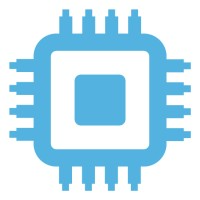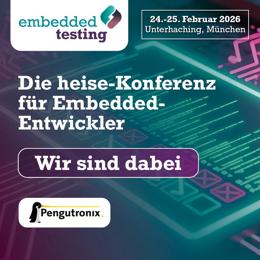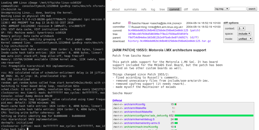Pengutronix at FOSDEM 2021
"FOSDEM is a free event for software developers to meet, share ideas and collaborate. Every year, thousands of developers of free and open source software from all over the world gather at the event in Brussels. In 2021, they will gather online." -- FOSDEM
This year, we will gather at 6th and 7th February and members of Pengutronix will contribute to FOSDEM with three talks.
So, grab your beer (what would a FOSDEM be, without beer?) and join us!
| Time | Testing and Automation devroom |
|---|---|
| Sa, 12:25 | About the joy and tears of testing Embedded Devices (Chris Fiege) |
| Time | Embedded, Mobile and Automotive devroom |
|---|---|
| Sa, 13:00 | From Reset Vector to Kernel: Navigating the ARM Matryoshka (Ahmad Fatoum) |
| Sa, 16:00 | The Road to the Mainline ZynqMP VCU Driver (Michael Tretter) |
About the joy and tears of testing Embedded Devices (Chris Fiege)
Embedded development is complex enough. By automating repetitive parts during development and employing testing, a lot of time can be saved and human errors avoided. Additionally, embedded development is usually a team effort: scarce hardware must often be shared between developers and sometimes even with automated testing. labgrid is an open source tool for remote control and testing of Embedded Linux Devices in a distributed lab. In this talk the presenter takes a look at how labgrid can be used in your Embedded lab and what labgrid's developers have learned in over three years of using and developing it.
At first the presenter takes a closer look at what is actually needed to fully remote-control an Embedded Linux Device: What are the typical interfaces that need to be covered? What remote-control hardware is commercially available?
Next the presenter will focus on the labgrid framework. Labgrid is an embedded board control python library, with a focus on testing, development and general automation. After a short overview of the key design-concepts the presenter will discuss labgrid's architecture. This part finishes with a demo of how interactive development with labgrid looks like and how tests are implemented using pytest.
The talk will conclude with a lessons-learned with the joy and tears of over three years of active labgrid development and use.
The Road to the Mainline ZynqMP VCU Driver (Michael Tretter)
The Xilinx ZynqMP SoC includes a powerful H.264/H.265 Video Codec Unit (VCU) which Xilinx supports with an out-of-tree driver and user space library. The allegro driver from mainline Linux allows to use the VCU using the standard V4L2 encoder API without requiring any custom user space.
I will explain why I wrote the driver, show how the VCU is used from a driver perspective, and present the current state of the driver and which features are still missing.
The Zynq UltraScale+ MPSoC integrates several ARM cores and an FPGA into a single chip. One variant of this SoC includes an H.264/H.265 Allegro DVT Video Codec Unit (VCU).
Although Xilinx did a good job supporting the ZynqMP in mainline Linux, the VCU was originally only supported via an out-of-tree driver. It consists of a user space library and a firmware blob, which interact via a custom IOCTL interface. Unfortunately, this has security implications as the user space handles physical buffer addresses.
Fortunately, the V4L2 mem2mem device API for video codecs avoids this problem by using abstract DMA buffers. Many applications already use these APIs, and various drivers for hardware codecs already implement these APIs. Thus, a V4L2 driver for the VCU allows reusing existing applications such as FFmpeg and GStreamer on the ZynqMP.
Further Readings
Pengutronix at Live Embedded Event
Now that, due to the COVID-19 pandemic, everyone has gotten used to digitalisation and online conferences - it has never been easier to organise a conference and bring together all experts and interested parties for a few hours of intensive exchange of ideas on a certain topic.
Pengutronix at the Embedded Linux Conference Europe
The schedule for this year's Embedded Linux Conference Europe (ELCE) has just been released. As in the last years Pengutronix contributes talks to current topics around Embedded Linux.
FOSDEM 2020 – Recommended Talks
FOSDEM is one of the biggest Open Source community meetings in Europe and takes place in Brussels at the Université Libre de Bruxelles every year in February. For Pengutronix this is always a good chance to meet developers, discuss current topics and enjoy some Belgian beer and food. This year we attended FOSDEM with 15 colleagues. Here are some talks our colleagues recommend you to see.
Pengutronix bei der Embedded Testing 2026
Pengutronix ist in diesem Jahr wieder Partner der der Embedded Testingu nd ist dort sowohl mit einem Stand als auch mit einem Vortrag vertreten. Die Embedded Testing findet am 24. und 25. Februar 2026 in Unterhaching bei München statt.Pengutronix at FOSDEM and OE Workshop 2026
On January 31st and Febuary 1st 2026 it is once again time for waffles, Belgian beer and Open Source: FOSDEM will take place at ULB in Brussels. With over 8k hackers, FOSDEM is the biggest and most important Open Source conference in Europe. One other event riding the wave of FOSDEM is the the OpenEmbeddedWorkshop. The full list of co-located events is here. We are participating in both FOSDEM and OE Workshop and are looking forward to many interesting discussions with developers of different Open Source software components – be it the Linux kernel, Yocto, Labgrid, Debian, and others...
You can buy RAUC and labgrid sponsor packages now
RAUC and labgrid are open source software projects started at Pengutronix, that are quite successful in their respective niche. Starting today you can buy sponsorship packages for both projects in the Linux Automation GmbH web shop, to support their maintenance and development.GStreamer Conference 2025
This years GStreamer conference was held at the end of Oktober in London, UK. Since GStreamer is our goto-framework for multimedia applications, Michael Olbrich and me were attending this years conference to find out what's new in GStreamer and get in touch with the community.
umpf - Git on a New Level
Modern software development is commonly accompanied by a version control system like Git in order to have changes to the source code being documented in a traceable manner. Furthermore, any version state should be easily reproducible at any time. However, for work on complex projects such as the BSP ("Board Support Package") of an embedded system with its multiple development aspects, the simple stacking of the individual changes on top of each other does not scale.
Pengutronix Kernel Contributions in 2021
2022 has started, and although Corona had a huge impact on our workflow, the Pengutronix team again made quite some contributions to the Linux kernel. The last kernel release in 2020 was 5.10, the last one in 2021 was 5.15, so let's have a look at what happened in between.
15 Years of i.MX in Mainline Linux
Today it has been 15 years since we mainlined support for Freescale/NXP's i.MX architecture in the Linux kernel! That was one small step for [a] man, one giant leap for (industrial Linux users') mankind :-) Here is some background about why it happened and what you might want to learn from history for your next embedded Linux project.












